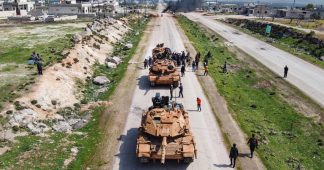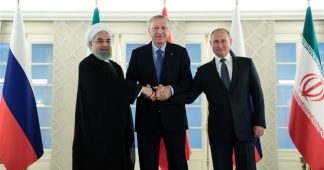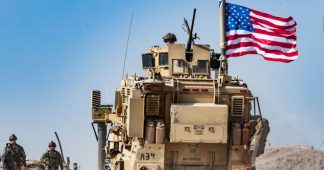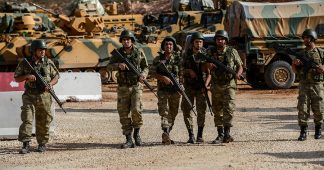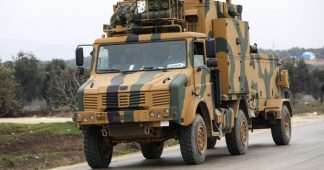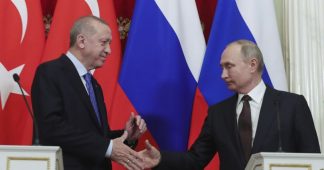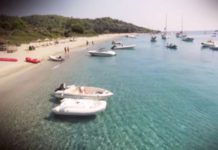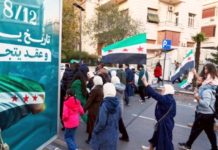by
The opening of the Saraqeb-Latakia road, known as the M4, is scheduled for this Sunday the 15th of March as established during the memorandum protocol signed in Moscow between the two presidents Vladimir Putin and Recep Tayyip Erdogan following the battle of Saraqeb. The Turkish-Russian patrols are supposed to secure the M4 following a three-day meeting in Ankara between Russian and Turkish military to coordinate the joint patrols and to prevent any attacks from Jihadists. Many jihadists groups reject the Russian-Turkish deal and will likely shell the road or try to kidnap drivers. Everything depends on how decisive the Turkish army and its allies in the Idlib area will be in adhering to the ceasefire, and how convincing Russia’s response will be if the ceasefire is violated.
The Aleppo-Damascus road, known as the M5, was liberated by military force (Russia, the Syrian army and its allies) and is now open for civilians. However, the Syrian army and its allies still use the safer Aleppo-Ithriya-Khanaser road. The battle of Saraqeb forced the Moscow deal and revived the 2018 Astana agreement that was ignored by Turkey for a year and a half.
Jihadists groups including Ansar al-Tawheed wal-Jihad, Ansar al-Islam, Ansar al-Deen, Kavkaz brigade and Hurras al-Deen (al-Qaeda in Bilad al-Sham) have decided to oppose the Russian-Turkish agreement and attack the joint patrol along the M4. These groups, along with Abu Imara, Tansiqiyat a-Jihad and Muhajereen brigade are sworn to oppose Turkey and Russia in rural Idlib. Northwestern Syria has been divided between two camps: one camp under Turkey’s control, acknowledging the Moscow-Astana agreement, and another rejecting it.
This week, a Russian military delegation visited Ankara to discuss with Turkish army leadership procedures to control the M4. Armed drones and Russian Air Force will be ready to intervene, along with Special Forces, to hit any attempt to oppose joint Russian-Turkish control of the M4 and to deal with any presence of jihadists along the road.
Al-Qaeda in Syria (Hurras al-Deen) issued audio of its Emir Hammam al-Suri (Samir Hijazi), one of the notorious Emirs of al-Qaeda who fought in Chechnya, Afghanistan, Iraq and Syria, asking Syrian and other jihadists to “persist” in their position, thereby rejecting withdrawal from the M4.
Abu Mohamad al-Joulani – the ex-ISIS Emir who led al-Qaeda in Syria and quit it later to lead his jihadist group “Hayat Tahrir al-Sham” (former al-Nusra) – “thanked the Turkish government for its support in the last battle”. Joulani was ambiguous about his intentions in the coming days, when Russian-Turkish patrols are supposed to take control of the M4, even if Joulani concluded that “only the language of weapons will prevail”, indicating his will to continue fighting.
The Moscow deal (and before it Astana) free the M4 from the control of jihadists who are mainly foreign fighters. They control the cities of al-Nerab, Ariha, Jisr al-Shughur and Bdama. These foreign fighters are said to be entrenched in these cities. They reject any withdrawal. It will be the Turkish task to convince these jihadists by force or dialogue before Sunday the 15th. Jihadists managed to survive and restore their food and ammunition via Turkey only. It will be a hard choice for them: to wage war on Turkey and lose everything, or to hope that Ankara will manoeuvre further and prolong their presence for another year.
On the other hand, the Russian military delegation visiting Turkey in the past days said the Turkish party had realised the seriousness of Russia’s intention to implement the Moscow agreement by all means. According to the Russian delegation, the Turks realised that the M5 had been opened by force and that the M4 will follow if the Jihadists fail to withdraw. It is all in Ankara’s benefit to dislodge the jihadists from the M4 and entrench them in the city of Idlib. President Erdogan has no intention to deliver Idlib back to the Syrian government.
Sources close to President Bashar al-Assad said that the problem is not with Turkey but with President Erdogan himself. “As long as Erdogan is in power, the problems between the two countries will persist. The Turkish president wants to divide Syria and keep control of the north, Idlib in particular, because it represents the first line of defence in front of Afrin. If Idlib is liberated, the Syrian army will knock the door of the north.”
Neither Russia nor Iran are willing to start a war with Turkey or to repeat the scenario of Saraqeb again. During the last battle for the control of the M5 and Saraqeb, the presence of the Turkish army along with Jihadists in the battlefield left 59 Turkish soldiers and officers killed, as Erdogan announced. The Turkish military was about to widen the conflict by indiscriminately bombing the Syrian army and its allies. The Turkish command was angered following the destruction of an armoured personnel carrier by a laser-guided missile (9M133 Kornet) fired by Syrian allies killing all Turkish servicemen in it. Turkey was planning to break the defence line on the city of Talhiyah but failed, notwithstanding the significant number of jihadists involved in the attack. Twenty-four hours before, Hezbollah Secretary General Sayyed Hassan Nasrallah ordered the dispatched of a large number of Ridwan Special Forces to reinforce the frontline notwithstanding the contest of his field commanders. Sayyed Nasrallah’s move saved the front from falling, a front that suffered a huge attack by Jihadists and Turkey.
Iran and its allies sent a strong message to Turkey warning they have no plans to be engaged in a war against Ankara troops but that they would if Turkey were to continue bombing their positions. Turkey concluded that Syria and its allies are determined to hold on to the entire liberated area and that a war between Turkey and Iran and its partners is not beneficial to any side involved.
Syria considers that Erdogan will not give up on the jihadists who obey his instructions. They represent a buffer and a significant asset he can use to fight in different parts of the world, i.e. Egypt, Libya, Syria, Iraq or anywhere he wants to be present. Jihadists help Erdogan to secure a place in the constitutional negotiation to limit the authority of the Syrian president and other reforms.
The presence of US forces in north-east Syria is a problem for Russia and the Syrian government since their goal is to “make it very difficult” to defeat jihadists and to “ban any assistance [of reconstruction] to put the country back together again”. Turkey, unlike the Syrian army, is capable of negotiating the US presence in the US-occupied north-east Syria. This is why Erdogan proposed to Putin joint management of oil fields in eastern Syria under US control. Putin left the door open without agreeing to Erdogan’s proposal. The Turkish presence in Syria has become more problematic than the US occupation as long as this Turkish president is in power.
Indeed, even if Erdogan asserted in Moscow his willingness to preserve the unity of Syria, he can always align himself behind more than one excuse to stay in Syria. The presence of millions of Syrian refugees internally displaced or the request of some elements – loyal to Turkey – of the Syrian population for Ankara to intervene as he has stated in previous occasions are enough reasons for him to keep his forces in Syria. This is the reason why Russia has enforced the opening of the M5 and M4 to crawl slowly towards Idlib city and limit the expansion of jihadists to a vast and challenging territory.
In the coming months, Russia and the Syrian government will rely on the rejection of jihadists in the Russian-Turkish agreement. If jihadists refuse to withdraw and continue violating the ceasefire (thirty violations registered in four days), there will be enough reasons for military intervention when all options are exhausted. This time Turkey will be able to do very little to protect the jihadists. Whatever direction this ceasefire will take, the battle of Idlib is far from over. It has only been postponed.
Published at https://ejmagnier.com/2020/03/14/the-battle-of-idlib-is-far-from-over/
